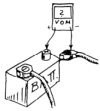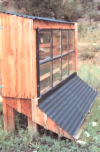This is an old revision of the document!
We are a group of three volunteers currently based in london, who run an alternative energy workshop. We will make an educational tour in summer 2015 to teach how to become truly independent from coal and nuclear power. On the tour we will demonstrate simple, low-cost wind and solar systems but with a particular focus on maintaining and rejuvinating batteries, as replacing batteries is undoubably the most environmentally damaging (and expensive!) aspect of off-grid living. We will teach basic battery maintenance as well as how to bring back to life old batteries which have become inefficient due to a build-up of sulphur on the lead plates. Most importantly, we want to teach how to convert old batteries to 'alum'. Alum is a salt, often used as a deodorant, and can also be added to pickles to make them crisp. It is much less environmentally damagining than sulphuric acid, and because it is non-corrosive to the battery terminals or lead plates, alum batteries almost never need replacing!
We believe energy autonomy is important not only from an environmental perspective but because it gives communities financial indepence and can make it possibile to live in more remote places, encouraging de-urbanisation and access to land. We want to move away from cities and closer to nature and to think long term.
Our tour will visit communities and farms across the UK who are using alternative energy, or would like to be. We will make our talks accessible to people of all ages and levels of knowledge, and will do childrens activites including alum crystal growing, to demonstrate how safe it compared to battery acid! We have been kindly donated a vehicle for the tour, and will install a workshop inside during the spring. We will also need to buy a small solar panel and material to build a wind-generator (we already have these things but we cannot take them away or we would leave our co-habitants in the dark!). We do NOT intend to use funding money for vehicle insurance, fuel, travel costs or food. These costs will be covered by us personally or by any donations we recieve.
The tour will be an opportunity for the groups we are visiting to share information, as we will
We indend to build a permanent mobile workshop inside a vehicle and make an educational tour in summer 2015. We will visit living communities and farms who aim to produce their own electricity by a renewable means and give practical educational workshops. After the tour the mobile workshop will be remain a community resource and be available for groups to use to build and maintain their own renewable energy systems.
Workshops and talks to include:
- Battery maintenance, rejuvination, recycling and salvage
In our experience, buying and replacing batteries is undoubably the most environmentally damaging (and expensive!) aspect of off-grid living. Old batteries often become inefficient due to a build-up of sulphur on the lead plates. We show how to use pulse charing circuits to gradually desulphate batteries, bringing usuable batteries back to life, meaning we can use salvaged batteries, reducing waste and saving money. We will also look at general battery maintainance, measuring battery acidity and discuss where to find old batteries for free or cheap.
- Ideas for crystal and salt batteries
Another problem with lead-acid batteries is that the lead plates corrode, giving a gradual build-up of lead deposits at the bottom of each cell. Eventually these deposits become so much that they short out the battery, making it useless. A more long term solution could be to use salts rather than acids in batteries. We have been experimenting with converting acid batteries to alum. Alum is the stuff deodorant crystals are made of. Alum batteries have a lower power density, meaning you need a heavier battery to give the same power as an acid battery. But they will never corrode. Which makes them a promising solution for long-term static off-grid systems. We believe such batteries are not available commercially simply because the industry favours products that will break and need replacing. We want to share ideas about these long term alternatives!
- Solar panel installation and maintenance
including regulators and maximum power point tracking - DIY Wind turbines based on Hugh Pigots design
- Building pedal generators
We will look at simple pedal generator designs, using DC motors and cycle training stands. - 12v lighting tips and tricks
Getting LEDs cheaply, and reducing loss on larger systems by using short cable runs and thick cable. - 12v food blenders and other appliances
Experimenting with old car windscreen wiper motors. - Soldering without mains electricity
using gas or battery powered solding irons, and using tree sap as flux for soldering! - Desoldering and salvaging components
Techniques for desoldering including using desoldering braid and solder suckers.
- Using less electricity rather than focusing on how to produce lots of power, we want to look at simple ways to reduce our consumption. We will look at ideas such as this solar dehydrator (pictured) which reduces the need for a refridgerator.
- Childrens activites including alum crystal growing, to demonstrate how safe it is compared to battery acid!
- Joule thief circuits
More information about all of these topics can be found on our Information and resources page
About our group
- Contact us at alttechtour [at] riseup.net




